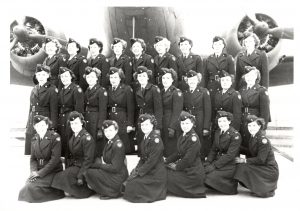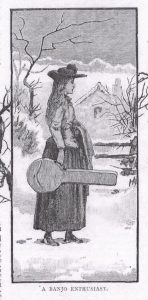A series of blogs identifying five general categories of the nurse character’s role in operas from the mid-seventeenth through the early twenty-first century. The categories are fluid and overlap, so that the nurse character can and usually does appear in more than one category within an opera. Taken from a careful study of librettos and available performances of a hundred-plus operas with at least one nurse character.
Comic Nurses: Arnalta and Nutrice
The Coronation of Poppea by Claudio Monteverdi, Libretto by Giovanni Francesco Busenello
Premiered in Venice, 1643
PART 2
Poppea Sabina has set her sights on Emperor Nero. Having divorced her first husband, she now is married to Marcus Salvius Otho, a close friend of the Emperor. Otho’s talk about his beautiful wife has caught Nero’s attention, and soon Poppaea and Nero are involved in a passionate, adulterous affair. Poppea’s nurse Arnalta tries to warn her mistress about the consequences of her amorous actions, but Poppaea takes no heed, choosing instead to focus on becoming Nero’s wife and Empress. That Nero currently is married to Octavia is no barrier for the scheming Emperor who simply decides to divorce her. In her counsel to the soon-to-be jilted Empress, Octavia’s nurse Nutrice advises revenge by taking a lover. Like Poppea, Octavia rejects her nurse’s advice, however, in this instance in favor of a virtuous if loveless life.
Like Poppea’s nurse Arnalta, Nutrice has concern for her mistress Octavia, but her advice in Act 1 is contrary to what Arnalta has been advising Poppea.
History paints Octavia as the virtuous victim of an arranged marriage. Wed as a young teenager to seventeen-year-old Nero, the historical Octavia’s life from that day onward “was a kind of funeral, brought, as she was, into a house where she had nothing but scenes of mourning.” 10 Nero had poisoned her father and her brother and, because life with Octavia soon bored him, Nero took Acte, a former slave, as his mistress. When his friends criticized his treatment of Octavia, Nero retorted, “Just being an emperor’s wife ought to be enough to make her happy.” 11 Obviously, it was not.
Octavia’s nurse probably came with the young bride into Nero’s household, having once been her wet nurse. In the anonymous drama Octavia, the Nurse character refers to Octavia as her “sad foster-child.” 12 The emotional bond between the two women, however, does not appear as strong as that between Octavia’s archrival Poppea and her nurse Arnalta, and in Raymond Leppard’s performance edition of the opera, Nutrice is omitted from the cast list, with some of her actions important to the plot given to Octavia’s lady-in-waiting Drusilla. 13
Nutrice sings in two scenes. In Act 1 scene 5, in her first appearance, Nutrice looks on as, in “Disprezzata Regina,” her dejected mistress Octavia laments the latest turn that her ill-fated marriage to Nero has taken. “How despised an Empress! an Empress!” she almost moans as she sings. Octavia’s emotions vacillate between despondency as she feels sorry for herself, and anger when picturing Nero’s deplorable behavior with Poppea. In her somber mood, Octavia implores the help of a higher power: “What now? Gods above, advise me! advise me!” When agitated by thoughts of the extramarital affair that Fate has dealt her, she appeals to Jove, “give ear to me now! Descend on Nero’s head as thunderer, thunderer, thunderer, thunderer, thunderer” – no amount of punishment is enough – “and destroy him lest a woman accuse you of injustice and weakness.” Having vented this anger in predictable downward rushing notes on the words “thunderer” and “destroy,” Octavia is ashamed of her blasphemy and vows to conceal “In silent pain and anguish the torment which racks me.”
Having listened silently, Nutrice can bear her mistress’s misery no longer and tries to interrupt her by calling Octavia’s name. Octavia is not done with her pleading, however, and now begs forgiveness of the gods above “if I have profaned thy holy honour.” Nutrice interrupts a second time, attempting to redirect Octavia’s thoughts: “Octavia, Octavia, O lady, are you not the Empress, high over all the nations?” the nurse asks. Octavia is still remorseful for her earlier irreverence and continues to repent. It was her mouth that spoke the sin, she says, not her heart.
For the third time, Nutrice tries to catch Octavia’s attention. “Listen, listen to the words of your nurse and let her advise you,” she pleads. This time the nurse is successful and offers her opinion on the matter. If Nero ignores his wife for Poppea’s “wanton kissing,” then Octavia should “seek out someone else who will restore you All the pleasures, all the pleasures you are missing.” If Nero is finding pleasure in adultery, Octavia should feel entitled to do the same, to spite her husband. Nutrice emphasizes her first mention of “All the pleasures,” sung as a stepwise ascent with a rest between each word and syllable.
A short ritornello allows time for Nutrice’s advice to sink in before the nurse continues. “Though you think your heart is breaking by a faithless husband spurned, here is counsel well worth taking” to turn woe into joy. Octavia is shocked: “Such dishon’rable counsel never yet to my ears my nurse has offered!” she retorts. But Nutrice is just winding up. “Think, think, think,” – again the emphatic stepwise descent with words separated by rests – “here is counsel well worth the taking.” Octavia would be safe with her secret affair, Nutrice points out, for if discovered, a fool would not believe it, and a wise man would keep silent. But Octavia is not convinced, since, rhetorically speaking, a woman betrayed by her husband’s lust is not dishonored.
Nutrice tries a different approach. “Daughter, daughter and dearest lady, and dearest lady,” she entreats Octavia in endearing terms, “you do not grasp it, no, you do not grasp it,” referring to “the demands and duties of high and noble vengeance. He injured you with pain and deprivation But you can only wound his reputation.” Having had her say, Nutrice repeats that her counsel is well worth taking to turn woe into joy.
Like Arnalta, Nutrice is showing her true colors as she remembers her own pleasures of the flesh; perhaps she had used a similar ploy when younger as revenge when a lover treated her unfairly. She does not like to see her mistress hurting, and as a pragmatist, recommends what may have worked in her own past. But Octavia, as stubborn in her own beliefs as Poppea is in hers, will not consider adultery. Having prayed, wept, and vented her “endless sorrow,” the betrayed Empress rejects her nurse’s advice and remains resolute in her repentant yet miserable frame of mind, with her virtue intact. Yet, as Chafe suggests, for Octavia, “Virtue is largely a matter of expedience,” for as the affair between Nero and Poppea escalates, the Empress reaches her tolerance level for a cheating husband and finds another way to avenge his ill treatment of her. 14
Thus far Nutrice has not shown her comic side, but when later in Act 2 scene 8 of L’incoronazione di Poppea the page Valletto’s bantering eases the tension following the scenes surrounding court philosopher Seneca’s death ordered by Nero, Nutrice, like Arnalta, reveals her inner coquette from years past, now only a nostalgic memory. What payment would you offer for one day of Drusilla’s youth and joy? the page asks the nurse, referring to Octavia’s lady-in-waiting. “Millions,” Nutrice replies. “I’d give all of the gold in all the empire.” Jealousy, self-hatred, a fatigued spirit, and declining senses were “the four basic elements of age in all its mis’ry,” turning her “old bones” into “no more than a walking graveyard.” Drusilla’s advice to “Cheer up and don’t despair, be merry,” since the nurse’s dawn clearly has passed but her night has not arrived, does not console Nutrice, who ponders her current state during the short ritornello that follows. As evening descends, a woman’s attraction ends, the nurse sings, exposing her commedia dell’arte roots. Another ritornello is prelude to Nutrice’s advice to young maidens such as Drusilla to “Follow when love calls ‘Hither’” in April and May; “don’t wait for sweaty summer – too soon you’ll wither.” The young Valletto eggs the nurse on:
Valletto. Come on, step lively, granny. …
Nutrice. Hold your tongue, or I’ll have you soundly beaten.
Valetto. … You antique from the market! …
Nutrice. Why, how dare you, why how dare you! …
Valletto. Let’t go, – to judge by your face The time is midnight, if not later still.
Poppea, too, is exhausted. After Seneca’s death and Nero’s divorce from Octavia, Poppea sees the way clear to her cherished dream to become Empress. In Act 2 scene 10 in her garden with Arnalta at her side, Poppea renews her cherished hope that with Love on her side, she will become Nero’s consort at last. Her singing reflects the zeal with which she has approached this objective in a melodic line emphasizing the word “consort” through repetition, which expands to a twenty-note melisma before Poppea winds down her fervent entreaty to Love. Arnalta uses the pause to make a request.
To Arnalta, Poppea’s ambitious quest is foolish, but it is the behavior, not the person, that troubles her. If you become Empress, do not scorn me and thrust me away, the nurse requests. “Let me serve you as I do today.” Arnalta’s concern for Poppea’s well-being returns: “Oh never put your faith in any courtier,” she advises. No one but she could advise Poppea properly in the dishonest environment of the court. The passage is open to different interpretations depending on whether the nurse is perceived as a wise counselor, opportunist “who realizes the way the wind is blowing,” or loving companion. 15 Arnalta is all of the above.
Arnalta need not have worried: “You need not fear, … I swear it. You will always be near me. I would not dream of having Other than you as my dear close companion,” Poppea sings to her beloved nurse. Poppea then repeats her appeal to Love, but her eyelids grow heavy, her vocalizing winds down in repeated notes with words broken off, interrupted by frequent rests; her tessitura lowers as well. The effect suggests that perhaps the effort to arrange a positive outcome has been a tiring one for Poppea.
The nurse then tenderly puts her grown-up nursling to bed with Poppea’s instructions not to let anyone but Drusilla or another close acquaintance into the garden. The lullaby that follows, “Oblivion soave,” which Celletti considers “one of the finest master-strokes in the whole history of opera,” provides a tranquil interlude before Ottone, dressed as Drusilla, attempts to murder Poppea. 16 In a calming melody that moves into a lulling triple meter reminiscent of a nurse rocking her baby, Arnalta vows to keep her “sweetest of creatures” safe. The nurse’s low vocal range and the slow-paced harmonic rhythm combined with long-held notes held at the ends of phrases offer musical serenity amidst the unsettling intrigues of Nero’s court.
In a rare moment of vulnerability Poppea is in her garden when her former lover, whom Octavia has blackmailed to do her murderous bidding, enters with knife in hand. By now the audience can no longer believe that Octavia’s “actions born of rage and vengeance are not part of her true character.” 17 Fortunately, Cupid (Amore), who is watching over Poppea, stops Ottone from using his weapon before any damage is done.
Working herself up into a frenzy of activity with a quickening march-like pace, Arnalta’s “Quickly help” is heard over and over again on repeated notes as she summons men and maidens to pursue who she thinks is Drusilla. As her mind latches on to Poppea’s close brush with death, Arnalta’s summons becomes increasingly agitated as she repeatedly instructs the responders to hurry. The murder attempt eventually is sorted out when Ottone refuses to let Drusilla, whose clothes he has borrowed for his disguise, take the blame; Nero banishes Ottone into exile, a fate that Drusilla gladly shares with him.
In Act 3 scene 12, the penultimate scene, Arnalta offers the moral of the story when she ponders her elevated status in life. 18 Such commentary traditionally has fallen to stock characters and to the Greek chorus, but in L’incoronazione di Poppea the soliloquy is particularly poignant, since Arnalta is experiencing personally the event about which she moralizes.
When Poppea succeeds in her quest and is about to be crowned Empress of Rome, Arnalta contemplates her own newfound status in the aria beginning “Oggi, oggi, sarà Poppea”: “I her nurse and companion, today I shall ascend the steps of greatness. Farewell the common herd! I leave you, I leave you and leave my lowly state.” Her former peers now will flatter her, call her a young beauty – “though truly I know I’m only a bag of wrinkles like some pre-Roman ruin”– in hopes of gaining Poppea’s favor. But in a moment of sober reflection, the former nurse realizes that, born a servant, she will die a lady; yet were she able to do it all again, “May I be born a lady and die a servant,” for “To leave behind one’s riches makes such a sad farewell.”
Wendy Heller views Arnalta’s aria “Oggi, oggi, sarà Poppea” as “a stunningly satirical commentary on female ambition.” 19 In some performances Arnalta’s attire parodies that of Poppea – an element of Roman comedy – to the extreme, hinting that her comments are relevant to servant and nobility alike. But beneath a comedic exterior, the nurse in her musical soliloquy offers a serious message: Social climbers with lofty ambitions – not unlike Poppea herself – will treat Arnalta differently now that she is positioned to be of use to them. And the nurse will bask in the glory of their deference while it lasts. But death comes to everyone, whatever station in life.
To Taruskin the nurse’s remarks are “farcical” and “gloating”; Ringer hears in Arnalta a “crowing, plebeian tune” reminiscent of “a street vendor’s ditty.” 20 But Arnalta’s comic veneer masks a more serious undertone. Described variously as a multidimensional stock character with a soul (Ringer) who alternates cynicism with tenderness and is capable of extreme loyalty (Celletti) yet incapable of self-deception (Iain Fenlon and Peter Miller), Arnalta appreciates her current good fortune even as she recognizes its illusory nature. 21 Her final words reflect this transitory position: “She can be happy, by death befriended, she can lay down her burden: work will have ended.” Quipping this last phrase, Arnalta sheds her exalted persona for her peasant roots.
That Poppea and Octavia do not heed their nurses’ advice creates a division between mistress and nurse apparent in the text and style of each woman’s musical exchanges. Poppea’s and Octavia’s emotional outbursts are countered by their nurses’ more sedate reasoning. Poppea’s singing is characterized by a rapid succession of quickly paced thoughts reiterated by textual repetition and musical sequence; short note values, embellishment, and a high tessitura further delineate her impetuosity. In contrast, Arnalta’s singing is slower, steadier, and in a lower vocal range suggestive of calm, sensible, sound advice, though she is not hesitant to embellish that advice musically to give it greater import.
The musical interaction between Nutrice and Octavia follows a different pattern. When the nurse on her third try finally breaks through her mistress’s impassioned diatribe to have her say about Nero’s infidelity, she introduces the pleasures that Octavia is missing with a rhythmic pattern of notes punctuated by rests before laying out her risqué proposal. Nutrice punctuates her advice similarly with a thrice-repeated “Think,” each separated by two rests, perhaps to emphasize that it has taken that many attempts to get through to Octavia, and uses the same motive as she concludes the justification for her plan. Like Arnalta, Nutrice has a counterargument for each of Octavia’s interruptions and, like Poppea’s nurse, she belabors her point until she has done her best to persuade her mistress to follow a different path. That both nurses fail in their attempts at persuasion defines more clearly the personality differences in each dyad and sets the stage for the events that follow.
A comprehensive list of the hundred-plus operas that include a nurse character is found on my website under BOOKS > The Nurse in History and Opera > Book Extras.
To learn more about how the nurse is portrayed on the opera stage, see Judith Barger, The Nurse in History and Opera: From Servant to Sister (Lexington Books, 2024).
Notes
- Tacitus, The Complete Works of Tacitus, ed. Hadas, trans. Church, sect. 63.57.
- Suetonius, The Lives of the Twelve Caesars, rev. ed., trans. Graves, sect. 35. In his novel Quo Vadis, Henry Sienkiewicz paints Acte as a timid, kind woman, sympathetic to the new Christians, who adores Nero and is his favorite concubine. The Emperor abandons her once Poppea enters his life. See Henry Sienkiewicz, Quo Vadis, trans. W. S. Kuniczak (New York: Hippocrene, 1993).
- Miller, Tragedies of Seneca, 424.
- See Claudio Monteverdi, L’incoronazione di Poppea / The Coronation of Poppea [vocal score], ed. Raymond Leppard (London: Faber, 1977).
- Chafe, Monteverdi’s Tonal Language, 330.
- Celletti, History of Bel Canto, 34.
- Celletti, History of Bel Canto, 34.
- Chafe, Monteverdi’s Tonal Language, 345.
- This scene with Arnalta and the previous one with Octavia sometimes are reversed in performance.
- Wendy Heller, “Tacitus Incognito: Opera as History in L’incoronazione di Poppea,” Journal of the American Musicological Society 52 (1999): 62.
- Taruskin, Oxford History of Western Music, vol. 2, 27; Ringer, Opera’s First Master, 301
- Ringer, Opera’s First Master, 234; Celletti, History of Bel Canto, 35; Iain Fenlon and Peter N. Miller, The Song of the Soul: Understanding Poppea (London: Royal Musical Association, 1992), 90.



